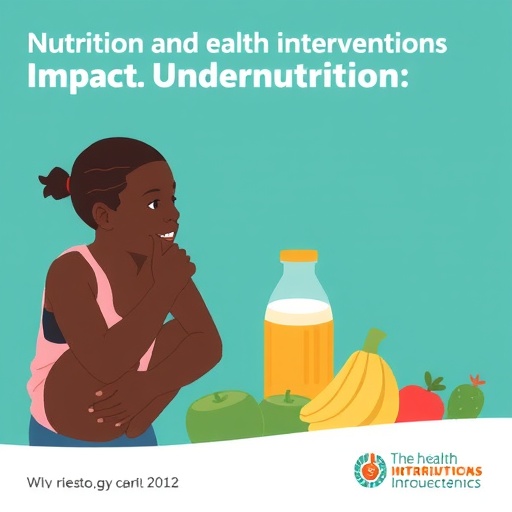In a groundbreaking correction published in the International Journal for Equity in Health, researchers Vilar-Compte, Rovelo-Velázquez, Nguyen, and colleagues have meticulously revisited their comprehensive overview on the impact of nutrition and health interventions on undernutrition. This pivotal correction not only refines earlier analyses but significantly deepens our understanding of how combined strategies can alleviate one of the most persistent challenges in global health: undernutrition. The paper, appearing in volume 24, highlights critical nuances and corrections that underscore the complexities faced in designing effective interventions in diverse populations.
Undernutrition remains a multifaceted global crisis, disproportionately affecting vulnerable populations, particularly children under five, pregnant women, and marginalized communities. Its consequences are far-reaching, contributing to increased morbidity and mortality, impaired cognitive development, and reduced economic productivity. This correction provides an updated synthesis from numerous systematic reviews analyzing a spectrum of nutrition and health programs aimed at mitigating these adverse effects.
A key element addressed is the rigorous methodological framework employed to assimilate data across different health systems and socio-economic contexts. The authors emphasize the importance of harmonizing intervention metrics and outcome measurements to develop reliable cross-study comparisons. By refining eligibility criteria and inclusion parameters for systematic reviews, the correction helps clarify previously ambiguous conclusions and removes data redundancies to strengthen the validity of the findings.
Critically, the correction delves into the heterogeneity of intervention types, ranging from micronutrient supplementation and food fortification to behavior change communication and sanitation improvements. These integrated approaches underline the necessity of multifactorial strategies rather than isolated solutions. Vilar-Compte et al. highlight that singular nutrition-focused interventions often yield limited success unless paired with broader health system strengthening and social determinants of health considerations.
One striking revelation in the updated analysis is the amplified efficacy of community-based interventions that couple nutritional support with maternal and child health services. Such programs demonstrate enhanced outcomes in reducing stunting and wasting and improving cognitive milestones. The correction provides nuanced insights into how community engagement, cultural competence, and local resource mobilization play pivotal roles in sustaining intervention impact over time.
The research also revisits the role of economic and policy environments, detailing how social protection schemes like conditional cash transfers can act as catalysts in improving food security and nutrition status. These policy-level interventions are shown to create enabling environments that improve uptake and adherence to nutrition programs, addressing barriers at the household and systemic levels.
Furthermore, the correction integrates an in-depth assessment of the temporal dynamics of intervention impact. Longitudinal data synthesis reveals that short-term improvements often do not equate to sustained nutritional gains unless reinforced by continued programming and monitoring. This finding challenges policymakers and implementers to design interventions with longevity and adaptability as core principles.
Technological advancements and digital health innovations also find mention as transformative tools in scaling nutrition interventions efficiently. Mobile health platforms allow for real-time monitoring, personalized counseling, and improved supply chain management, crucial for reaching remote or underserved populations. The correction articulates how such integrations can complement traditional methods, enhancing transparency and accountability.
Importantly, the authors underscore equity as a central theme, revealing that interventions must be tailored to address the unique needs of marginalized groups to avoid exacerbating health disparities. The correction’s nuanced tables and subgroup analyses illustrate differential impacts across gender, socioeconomic status, and geographical settings, highlighting the essential nature of equity-focused program design.
The correction further discusses the methodological challenges inherent in evaluating complex, multi-component interventions. By providing improved guidance on statistical models and risk of bias assessments in systematic reviews, it advocates for more rigorous and transparent evaluation standards. This advancement is vital for generating actionable evidence to guide global nutrition policies.
In terms of future directions, the authors call for increased investment in implementation science to unravel why some interventions succeed while others falter in similar contexts. Enhanced context-specific evidence can inform adaptive programming and optimize resource allocation, ensuring interventions are both cost-effective and culturally appropriate.
Moreover, the correction brings to light the synergistic potential of integrating nutrition with water, sanitation, and hygiene (WASH) interventions, illuminating how addressing underlying infection burdens can amplify nutritional benefits. This holistic perspective advocates for intersectoral collaboration as a cornerstone of sustainable development goals.
The implications of these findings are profound for governments, international agencies, and non-governmental organizations involved in combatting undernutrition worldwide. By articulating a refined evidence base, the correction empowers stakeholders to design multifaceted, equity-driven strategies that align with both local realities and global commitments.
Ultimately, the corrected overview by Vilar-Compte and colleagues constitutes a critical milestone in nutrition research. It galvanizes the scientific community to embrace complexity and pursue integrated, contextually appropriate interventions that can disrupt the cycle of undernutrition and foster healthier, more equitable societies.
Subject of Research: Impact of nutrition and health interventions on undernutrition, analyzed through an overview of systematic reviews with corrections refining methodological and contextual understanding.
Article Title: Correction: Impact of nutrition and health interventions on undernutrition: an overview of systematic reviews.
Article References:
Vilar‑Compte, M., Rovelo‑Velázquez, N., Nguyen, H.T.M. et al. Correction: Impact of nutrition and health interventions on undernutrition: an overview of systematic reviews. Int J Equity Health 24, 322 (2025). https://doi.org/10.1186/s12939-025-02703-z
Image Credits: AI Generated




